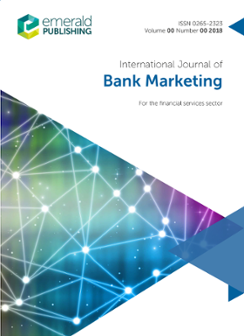无银行和有银行的人对银行的不信任
IF 6.9
3区 管理学
Q1 BUSINESS
引用次数: 0
摘要
目的本研究的目的是探索对传统银行机构的不信任这一概念,将其作为一个因素来解释在一个旨在实现金融包容性的市场中选择保持无银行账户。设计/方法/方法2021年5月至2022年2月期间,从17819名居住在美国的消费者那里收集的收入、支出、储蓄和借贷数据被用来检验与对银行的不信任相关的因素。这项研究采用了借鉴卫生服务专业的概念框架,分两个阶段进行。在第一阶段,使用Boruta随机森林算法估计无银行和有银行的人之间的不信任。在分析的第二阶段,估计了logit回归模型,以验证Boruta随机森林分析中确定的变量。分析结果表明,对银行的不信任是多层次的,年龄较大、认为国家正朝着错误的方向发展、对自己获得1至999美元个人贷款的能力缺乏信心,是导致无银行人群对银行不信任的重要因素。研究局限性/含义本研究展示了如何使用基于决策树方法的集成机器学习技术来获得对银行营销领域内复杂数据和大型数据集的独特见解。原创性/价值本文讨论了如何利用信任领域和特定变量来解决美国持续存在的金融排斥问题。对银行家、研究人员、教育工作者和政策制定者提供了启示。本文章由计算机程序翻译,如有差异,请以英文原文为准。
Distrust of banks among the unbanked and banked
PurposeThe purpose of this study was to explore the concept of distrust of traditional banking institutions as a factor that can explain the choice to remain unbanked in a marketplace that is designed to be financially inclusive.Design/methodology/approachEarning, spending, saving and borrowing data collected between May 2021 and February 2022 from 17,819 consumers living in the United States were used to examine the factors associated with distrust of banks. Using a conceptual framework borrowed from the health services profession, the study was conducted in two stages. At the first stage, distrust among the unbanked and banked was estimated using a Boruta-random forest algorithm. At the second stage of the analysis, a logit regression model was estimated to validate the variables identified in the Boruta-random forest analysis.FindingsResults from the analyses show that distrust of banks is multi-layered where being older, believing the country is heading in the wrong direction and being less confident in one's ability to obtain a personal loan in the amount of $1 to $999 are important factors related to distrust of banks among the unbanked.Research limitations/implicationsThis study shows how an ensemble machine learning technique based on a decision-tree methodology can be used to obtain unique insights into complicated data and large datasets within the bank marketing field.Originality/valueThe paper provides a discussion about ways domains of trust and specific variables can be utilized to address the persistent problem of financial exclusion in the United States. Implications for bankers, researchers, educators and policymakers are provided.
求助全文
通过发布文献求助,成功后即可免费获取论文全文。
去求助
来源期刊

International Journal of Bank Marketing
BUSINESS-
CiteScore
10.70
自引率
18.90%
发文量
54
期刊介绍:
International Journal of Bank Marketing (IJBM) aims to publish papers that relate to the marketing challenges of financial services providers around the globe.
Preference is given to empirically-based research papers that expand on existing theories (or develop new ones) on customer behaviour in financial services settings.
In addition, the journal is interested in helping academicians and practitioners in the field to better understand the discipline of financial services marketing, and as a result review papers and thought pieces are invited for submission.
 求助内容:
求助内容: 应助结果提醒方式:
应助结果提醒方式:


